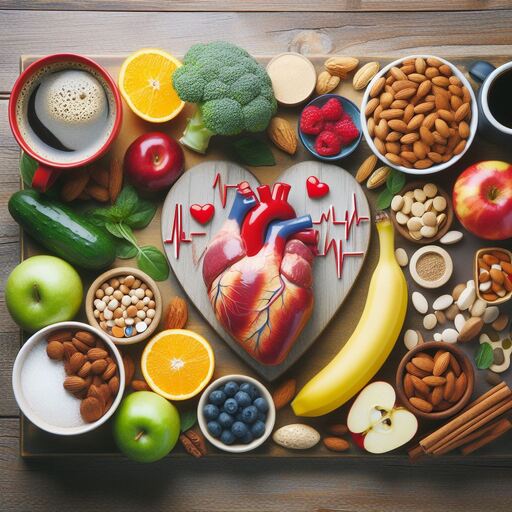Table of Contents
ToggleNutritional Tips for a Healthy Heart with Arrhythmia
Nutritional Tips for a Healthy Heart with Arrhythmia
Beating Strong: Nutritional Tips for a Healthy Heart with Arrhythmia
Managing arrhythmia—a condition marked by irregular heartbeat—can be a daunting task that affects every facet of life. However, beyond medical treatments and lifestyle adjustments, diet plays a crucial role in supporting heart health and managing symptoms. This article explores the impact of nutrition on arrhythmia, offering detailed guidance and practical tips to help individuals with arrhythmia strengthen their heart health through diet.
Nutritional Tips for a Healthy Heart with Arrhythmia
Understanding the Connection Between Diet and Heart Health
The heart is an organ that relies heavily on a steady supply of nutrients to function optimally. For those with arrhythmia, what you eat can influence heart rhythm, affect how medications work, and impact overall cardiovascular health. Dr. Lisa Marino, a cardiologist specializing in heart rhythm disorders, explains, “A heart-healthy diet can help control the factors that exacerbate arrhythmia, such as high blood pressure, high cholesterol, and obesity.”
Essential Nutrients for Heart Health
Nutritional Tips for a Healthy Heart with Arrhythmia
1. Omega-3 Fatty Acids: Omega-3 fatty acids are known for their anti-inflammatory properties and their role in maintaining heart health by reducing triglycerides and stabilizing heart rhythm. Foods rich in omega-3s include salmon, mackerel, sardines, flaxseeds, and walnuts.
2. Potassium: Potassium helps regulate heart rhythm and is critical in the management of arrhythmia. Bananas, potatoes, spinach, and avocados are excellent sources of potassium.
3. Magnesium: Magnesium is another mineral essential for good heart rhythm. It helps in the proper transmission of nerve impulses, contraction and relaxation of muscles, and the production of energy in the heart. Foods like almonds, black beans, and whole grains are rich in magnesium.
4. Fiber: A high-fiber diet can help improve blood cholesterol levels and lower the risk of heart disease. Fiber-rich foods include oats, berries, apples, and vegetables.
5. Calcium: Calcium is vital for maintaining healthy communication between the brain and every part of your body, including the heart. Dairy products, fortified plant milks, and green leafy vegetables are good sources of calcium.
Dietary Patterns to Consider
1. The Mediterranean Diet: Widely recognized for its benefits to heart health, the Mediterranean diet emphasizes eating primarily plant-based foods, such as fruits and vegetables, whole grains, legumes, and nuts. It also includes healthy fats such as olive oil instead of butter, and fish and poultry instead of red meat.
Nutritional Tips for a Healthy Heart with Arrhythmia
2. The DASH Diet: The Dietary Approaches to Stop Hypertension (DASH) diet is designed to help prevent or treat hypertension but is equally beneficial for heart health overall. It focuses on fruits, vegetables, whole grains, and lean proteins and limits foods high in saturated fat and sugar.
Avoiding Heart-Unhealthy Foods
Just as some foods can support heart health, others might undermine it, especially for those with arrhythmia:
- High Sodium Foods: Excessive sodium intake can lead to high blood pressure, which can aggravate arrhythmia. Limiting processed foods, canned soups, and salty snacks is advisable.
- Caffeine: High amounts of caffeine can trigger arrhythmia in some people. It’s important to monitor how your body reacts to caffeine and limit coffee, tea, and energy drinks as necessary.
- Alcohol: Alcohol consumption can have a negative impact on heart rhythm and should be consumed in moderation, if at all.
- High-Sugar Foods: Excessive sugar intake can lead to weight gain, which is a risk factor for cardiovascular disease. Avoid sugary drinks, sweets, and pastries.
Nutritional Tips for a Healthy Heart with Arrhythmia
Practical Tips for Incorporating Heart-Healthy Foods
- Start the Day Right: Begin with a breakfast rich in fiber and omega-3 fatty acids, such as oatmeal topped with flaxseeds and berries.
- Smart Snacking: Opt for snacks that provide a good mix of proteins and healthy fats, like apple slices with almond butter or a small handful of nuts.
- Hydrate Wisely: Stay hydrated with water, herbal teas, or other non-caffeinated beverages to help the heart pump blood more efficiently.
- Prepare Meals at Home: Cooking at home allows you to control ingredients and make healthier choices. Use herbs and spices for flavor instead of salt.
Success Stories: Real-Life Impact of Diet on Arrhythmia
Case Study 1: John, who was diagnosed with atrial fibrillation, adopted the Mediterranean diet on his doctor’s recommendation. Over several months, not only did his symptoms reduce, but his blood pressure also improved significantly.
Case Study 2: Sarah, a young professional with premature ventricular contractions (PVCs), experienced fewer episodes after reducing caffeine and sugar in her diet. She also noticed increased energy levels and overall better health.
